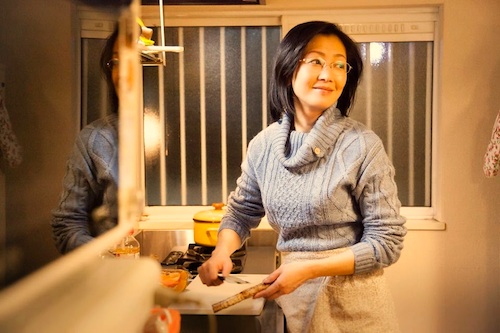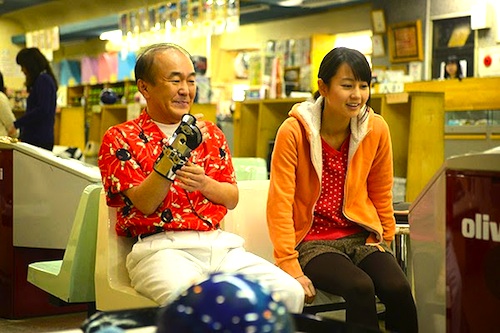
By Joe Bendel. Mugiko Koiwa’s life revolves around anime. Her brother Norio is all about pachinko. Neither is particularly industrious, but fortunately their long lost mother Saiko was helping pay the bills, unbeknownst to her daughter. Sadly, Saiko will not have enough time to rebuild their relationship, but Mugiko will learn to appreciate her mother after the fact in Keisuke Yoshida’s My Little Sweet Pea, which screens as part of this year’s Japan Cuts: the New York Festival of Contemporary Japanese Film.
Pleading hardship, Saiko moves in with Mugiko and the surly Norio, who shacks-up with his girlfriend shortly thereafter. It is a decidedly awkward situation for Koiwa, who always thought Saiko had abandoned her family. While she makes some halting efforts, she never really accepts Saiko into her life before the older woman’s death. Unsure of her own feelings, Koiwa agrees to takes her mother’s ashes to her provincial home town for her forty-nine day ritual.
However, Koiwa is rather shocked when the community receives her like a rock star. Evidently, she is the spitting image of her mother in her younger years. Saiko only visited once after moving to Tokyo to fruitlessly pursue her pop star dreams, but she is fondly remembered by all, particularly her cabbie Manabu Inomoto, a luckless suitor, and Saiko’s best friend, Michiru. It turns out Koiwa has a lot to learn about her mother and she will have the time to learn, thanks to some missing internment paperwork.
If you prefer your films on the cynical side then Sweet Pea might just make you break out in hives. However, anime fans should sit up and take note, Production I.G (the studio behind Ghost in the Shell) created original animated sequences seen during Koiwa’s early fangirl sequences. They are pretty cool, but they are a distinct anomaly in their filmography.

The real point of Sweet Pea is Koiwa’s journey rediscovering her lost mother. As her host and guide, Michiru, Yumi Asou is wonderfully warm and humane, unexpectedly outshining just about everyone. On the other hand, Yoichi Nukumizu indulges in a bit of shtick as Inomoto. Nevertheless, he nicely turns his big serious third act speech. Maki Horikita portrays Koiwa’s internal arc of development with believable restraint, but Ryuhei Matsuda makes little impression as brother Norio, while Kimiko Yo’s Saiko never really lands the emotional haymaker.
The Oscar winning Departures (which co-starred Yo) is an obvious comparison film, with the misunderstood Saiko taking the place of the encoffineer’s absentee father. While Sweet Pea is not nearly as devastating, it feels more true to life. It is a wistful, endearing film that works on its own terms. Recommended for fans of tearjerkers with anime seasoning, My Little Sweat Pea screens tomorrow (7/19) at the Japan Society as part of the 2014 Japan Cuts.
LFM GRADE: B
Posted on July 18th, 2014 at 11:34am.